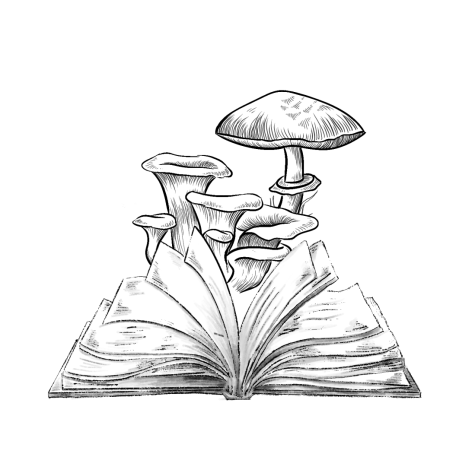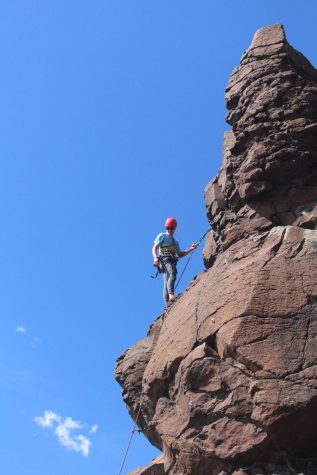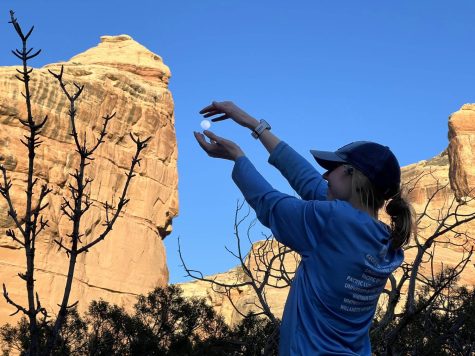Whitman Outdoor Journal aims to expand meaning of the outdoors
February 16, 2023
Yesterday, I walked beneath Walla Walla’s cloudless blue skies with 52 degrees of sunshine beaming down, wholeheartedly believing that spring had begun in February. I sat outside Cleveland Commons to eat lunch, strained to listen to the torrential rush of snowmelt in Mill Creek, took my sweatshirt off because I was too warm, put it on again because I was too cold and squinted into the western afternoon sun.
Was that experience traditionally “outdoorsy?” Probably not. Could it have a place in the first edition of the brand new Whitman Outdoor Journal (WOJ)? Maybe.
The WOJ is a brand-new ASWC-funded publication hoping to release its first issue this spring. The volume will feature stories, artwork and photography from Whitman students, faculty and alumni in the outdoors. But what counts as “outdoors?” Why the emphasis on stories rather than on meditations, wonderings or explorations? Most importantly, whose story counts?
The WOJ’s Chief Passage Editor, Outreach Coordinator and Interim Editor-in-Chief Arden Hunt wants the binding thread of the WOJ to be meaning — meaning made not from experience alone, but from the connection experience fosters.
“If you have a meaningful experience in the outdoors, a meaningful connection to the outdoors… or if you feel like you connected to nature in a meaningful way, then we want to hear about it,” Hunt said.
Hunt was practically born into the outdoors. Her story of backpacking Mt. Rainier’s Wonderland Trail is one of the 2023 WOJ’s dozen stories.
“I’ve been going outdoors for as long as I can remember. I learned to ski when I was three years old, I’ve been backpacking since I was in first grade [and] my family was all very into the outdoors,” Hunt said. “It’s been really cool being able to have a new perspective [at Whitman] now that it’s not my parents telling me to go outside — it’s me fostering that love individually.”
I think of myself as a timidly “outdoorsy” person. I was first introduced to backpacking as a 14 year-old on a YMCA-led trip along Olympic National Park’s Wilderness Coast; four years later, I’m still scared of the dark, bears and hypothermia. I started hiking on my own at 17, and I vividly remember crying on Poo Poo Point’s two-mile Chirico Trail because of how anxious I was about my physical ability to get to the top.
I think of myself as a homebody — I’m hesitant to spend money on gas, eager to define nature beyond the context of recreation and curious about the place of nature in everyday human-dominated spaces. I can see potential for meaning in the nagging climate anxiety that underlies basking in the warmth of the sun at the beginning of February, or maybe in the closeness of concrete-walled Mill Creek to its freer flowing headwaters — the sun is shining, the snow is melting and I can hear it in the crash of water against concrete.
The danger is that if I pit the stories of the timid backpacker in the wilderness and the homebody on Whitman’s campus against each other, my brain subconsciously prefers the former. If both stories ended up in the pages of the WOJ, maybe I’d be more inclined to view both experiences as equally valuable — there’s a powerful place for the WOJ as a conscious corrective to those unconscious biases.

The WOJ’s inspiration is the Colorado College Outdoor Journal, which emerged as a “radically more inclusive” revision of the college’s previous publication, the Colorado College Alpine Journal. The WOJ, meanwhile, emerges alongside Whitman’s Environmental Studies Program, which is often the academic outlet for those who love the outdoors.
Senior environmental studies-anthropology major Jaden McGinty has “had friends who have complained about not feeling very welcome in the Environmental Studies Program — they need to do more work to maintain their legitimacy in that space than others.”
McGinty added, “It’s really important for people to be seeing, reading and hearing about experiences besides the ones their immediate social circle has.”
The analog of the Environmental Studies Program to Colorado College’s Alpine Journal isn’t perfect, but both serve as a reminder of the historic exclusivity of outdoor spaces — access to the outdoors has traditionally been a privilege of the able, white, masculine and wealthy. That exclusivity is easy to perpetuate if it isn’t engaged critically.
The WOJ is hoping to create campus-wide conversation about what it means to be a Whitman student outdoors. Facilitating a campus-wide dialogue about the outdoors means the WOJ must deliberately engage with the privilege inherent in outdoor recreation.
Freshman Gwen Marbet, slated to be WOJ’s Editor-in-Chief for the 2023-2024 school year, currently works on the WOJ’s layout, editing and outreach. Marbet is sensitive to the stereotypical hierarchy of those who are traditionally “outdoorsy” versus those who have more unconventional relationships to nature.
Marbet, like many Whitman students who don’t come from particularly outdoor-oriented backgrounds, knows that it’s easy to feel that your story “doesn’t matter or it doesn’t measure up to those of people here [at Whitman] who have been skiing and climbing their entire life — it’s been a second language to them; their parents taught it to them, [and] it was just natural.”
You could characterize Marbet as a first generation outdoors person, but that label bears the damaging assumptions that one’s relationship with nature begins only when you set foot into the realm of outdoor recreation. Coming to the outdoors without the knowledge (and gear) that parents often pass down is difficult, but it also means that you get to define the outdoors for yourself.
For Marbet, beginning a relationship with the outdoors in places like the San Juans looked like “wandering on the beach, and the beaches just stretch on for miles and miles … it was such a beautiful way to spend my time as a child.”
Marbet’s background is unique to the WOJ’s staff. Former Editor-in-Chief of the WOJ Harrison Whittemore was Marbet’s Whitman Outdoor Orientation Trip (WOOT) leader. Despite experience on U.S. Forest Service Trail Crews, the WOOT in the Wallowas was Marbet’s first backpacking trip. Whittemore knew that Marbet’s perspective would add value to a staff dominated by students who inherited the outdoors like a family heirloom.
It wouldn’t be difficult to write a critique of the WOJ as a platform catering to Whitman’s able-bodied, rock-climbing, backpacking, often white and frequently affluent students. It’s hard to argue for a platform predicated on a space that can be as inaccessible as the outdoors. So, why start the WOJ in the first place?
The WOJ’s first issue is dedicated in memory of Ella Carr, a close friend of the students who founded the WOJ. In March of 2022, Carr died in a backcountry skiing accident at Oregon’s Anthony Lakes.
“She found some kindred spirits who purposefully sought out discomfort with her … [and] in the spaces between the happenings, she found love,” Carr’s obituary reads. “She had seemingly achieved her highest joy at the end of her life.”
The kindred spirits Carr found at Whitman are the reason a publication like the WOJ is almost inevitable — there is love, joy and purpose to be found in the dominant narrative of outdoorsiness. There are experiences that need to be shared with a greater audience.
An excerpt from the story sophomore Kiana Potter wrote for the WOJ reads, “I was taken in by the view. It swallowed me whole, pulling me in until I was no different from it; an overarching unattested acceptance of the essence of my existence. Standing there felt like tangible growth, as if I could consciously detect the formation of new neural pathways that would urge me down the coveted untraveled road … It was as if the universe gathered words in its chest and exhaled them as whispers into my ears. This is a pivotal moment.”
The WOJ declined to share what view Potter wrote about, but I doubt she’s writing about Whitman’s duck pond.
Potter writes of a complete immersion into nature that makes it impossible to draw the line between self and collective — a surrendering that transforms you, challenges you, rearranges you and spits you out, teary-eyed and blinking, born anew. Potter writes of the nature I hold closest to my heart, but the WOJ also has a responsibility to challenge that — Potter’s nature isn’t the only nature.
It’s essential to be wary of the definitions of nature that are privileged over others and of the experiences that are given space and those that are made invisible — the WOJ’s anxiety of inclusion isn’t misplaced. Not every wilderness experience is as grand as Potter’s, and not every walk across Whitman’s campus is unimportant; the WOJ carries the burden and the joy of highlighting the stories of those who live in, work in, recreate in and love the outdoors.






